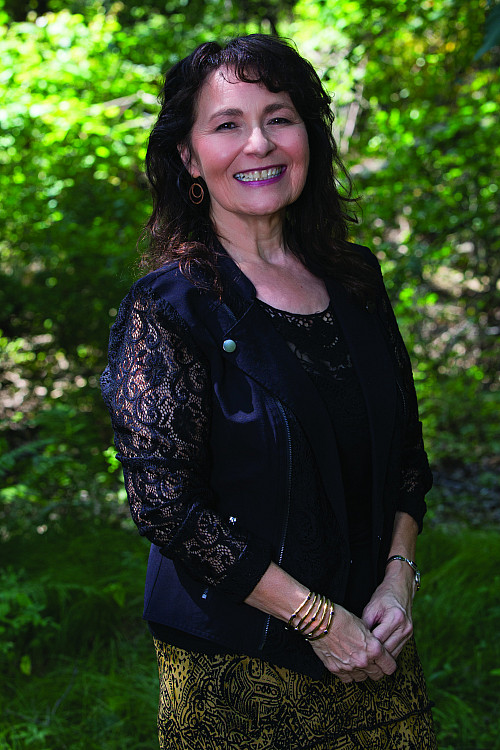Indigenous voices
Mackey Chair in Creative Writing Kimberly Blaeser presented a multimedia poetry reading with two members of In-Na-Po (Indigenous Nations Poets). She also talks about inspiration, nature, and the importance of oral poetry.

On April 5, Kimberly Blaeser, the 2024 Lois and Willard Mackey Chair in Creative Writing, presented a highly-anticipated and unusual poetry reading in Pearsons Hall’s Moore Lounge. She was accompanied by two other Indigenous poets, Kalehua Kim and Halee Kirkwood.
Each year, a distinguished author is invited to Beloit to teach a semester-long advanced creative writing course and hold a public reading as the Mackey Chair.
A member of the White Earth Nation, Blaeser is an Anishinaabe activist, photographer, and author of five poetry collections. She is also professor emerita at the University of Wisconsin-Milwaukee and the founding director of In-Na-Po (Indigenous Nations Poets), an organization dedicated to raising the voices of Indigenous poets and recognizing poetry’s importance in sustaining sovereign nations and Native languages.
Blaeser grew up surrounded by nature. Holed up inside during the winter, her family often told stories and recited poetry for entertainment. Her father had many poems memorized and could recite them off the top of his head. “That oral culture influenced me a lot. When my dad got older he was legally blind but he still had poetry because he had all these poems inside him,” says Blaeser. “If poetry can be a tool for understanding the world, it’s a tool you can carry with you if you memorize it.” She believes oral poetry is as important as the written word.
Blaeser finds inspiration and peace in the wilderness. She lives by the water and enjoys taking a kayak out, along with her camera and writing equipment. “Sometimes I’ll do the writing in the kayak, sometimes I’ll just take photos. I’m inspired by that place,” she says. “It allows me to disconnect from some of the chaos of life and makes me more perceptive to what’s there.”
Water is a common motif in Blaeser’s work. In the poem “The Where in My Belly,” she writes, “Scientists say my brain and heart are 73 percent water — they underestimate me.” Where and how she grew up largely informs her work. “That is the person I am and that’s the way I see the world, through the lens of that Anishinaabe woman who grew up in the watery regions of Minnesota.”
The resistance within Blaeser’s work also comes from her life experiences. “I also wanted to push against the negative representations of Indigenous people or the misconstructions around our history and culture,” she says. “There’s a lot of resistance in my poetry that arises from growing up on a reservation where racism is still a thing.”
The poetry reading began with a land acknowledgement and welcome from Chris Fink, English professor and organizer of the Mackey Chair. A former student of Blaeser’s and past member of her multicultural writers group, Word Warriors, Fink thanked her for helping him feel like he belonged within the community and praised her as an artist and mentor.
Then, Blaeser took the stage to introduce Kim and Kirkwood, who are In-Na-Po Fellows. She presented a short film titled “Poems For A Tattered Planet,” which combines visuals and spoken word poetry. The video was created by members of In-Na-Po and is available on YouTube.
Kim, a native of Hawai’i and the 2023 recipient of the James Welch Prize for Indigenous Poets, currently resides in Washington state where she is pursuing her MFA at Pacific Lutheran University. She was the first to read, performing three poems, one of which, “Mystique,” was inspired by her love for ’80s hip-hop and incorporated song.
Kirkwood read their selection of poetry next. A descendant of the Fond du Lac Band of Lake Superior Ojibwe, Kirkwood was the 2023 recipient of the James Welch Prize. They read several poems, including “Left Hand To The Ruined River” and “On Moccasin Mike Road,” which they dedicated to the mounds at Beloit and every ancestral resting ground.
When Blaeser took the podium, her reading was accompanied by a slideshow of her photography. She began by reading from her newest collection titled Ancient Light, released earlier this year. The poem “The Dignity of Gestures” was dedicated to Nathan Phillips, an Indigenous activist. She finished the night with two short pieces from her series “The Way We Love Something Small.”
After the reading, the poets answered questions and finished the night with book signings and sales.
More about Ancient Light can be found here.


